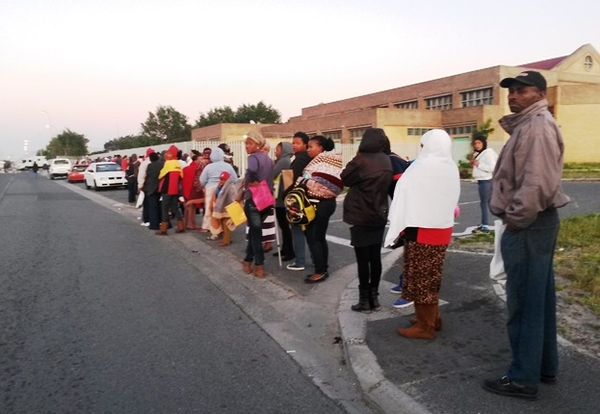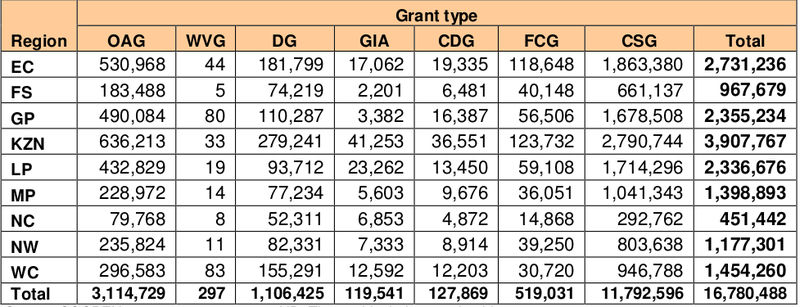Spotlight on social grants: How the system works

It’s 6:30am on a cold Wednesday morning and about 50 people, mostly women with babies, are already queuing outside the South African Social Security Agency office in the Delft library to apply for their child support grants.
If their applications are successful, each will receive R330 a month.
Spotlight on social grants
A GroundUp series
On 23 September, Naiema Nolan, a 38-year-old mother of two, is first in the queue. She says she arrived with her four-month-old daughter, Shafeeqa, at 2am. They spent the night at the police station near the library, leaving the baby’s pram in front of the gate to mark their place in the queue.
“They want to see that you have a child, so we have to bring the babies with us,” she says. Nolan says the grant will help to buy basic essentials for her baby.
One woman had been paid R50 to stand in the queue for a prospective applicant.
As of the end of June 2015, just under 16.8 million social grants were paid to approximately 10 million people. Most are child support grants (11.8 million), with some families getting more than one of these. Pensioners make up the second-largest group of recipients: 3.1 million. About R53.5 billion will be paid out to pensioners this year, the largest slice of the R155.3 billion social security pie. 1
There are eight grants:
- Child Support Grant: R330 per month
- Older Person’s Grant (pension): R1,420 per month (R1,440 for people over 75)
- Disability Grant: R1,420 per month
- Grant-in-Aid (for people who need a full-time caregiver): R330 per month
- Care Dependency Grant (to look after a child with severe disability): R1,420 per month
- War Veteran’s Grant: R1,440 per month
- Foster Child Grant: R860 per child per month
- Social relief of distress (temporary relief for people in dire need): food parcels or vouchers
Since 2012, the payment of social grants has effectively been outsourced to Net1, a company listed on stock exchanges in the United States and in Johannesburg. Net1’s subsidiary, Cash Paymaster Services (CPS), won the approximately R10 billion five-year Sassa tender in February 2012. The tender conditions were challenged in court by a rival bidder, AllPay, and in 2014 the Constitutional Court ruled the tender invalid but ordered that CPS should continue to run the system until it could be replaced.
A new tender will be awarded on 15 October (CPS is not bidding for it), and Sassa itself intends to take over the payment system from 2017.
Payment of the grants is a huge operation. Every month, the National Treasury deposits the total amount to be paid out, about R11 billion, into a Nedbank trust account. About two days later, CPS pays all the beneficiaries. The interest earned during this short period is earned by the state.
All beneficiary accounts are held at Grindrod Bank.
Payday is different each month, depending on weekends, public holidays and other logistics. Grant beneficiaries can collect their money at one of thousands of Sassa paypoints across the country or from various retailers and ATMs. But, says Net1 CEO Serge Belamant, withdrawals from Sassa paypoints, which carry no withdrawal charge, are more secure, with biometric security checks being done against people’s fingerprints.
Net1 also owns EasyPay, the company that enables grant holders to withdraw their money from retailers (like Pick n Pay), Moneyline, a company that provides loans to grant recipients, and Umoya Manje, a system to allow beneficiaries to buy cellphone airtime on credit.
For many grant recipients, the social grant is the difference between survival and starvation.
Nazlee Crouder, 43, has been in the Delft queue since 5am, waiting to hand in her application for a foster care grant for her 15-year-old brother. “ I really need help to look after him because things are expensive. I don’t have a choice, but to get up early and come stand in the cold,” she says.
 Social grants paid, June 2015. OAG=Old age grant. WVG=war veteran grant. DG=disability grant. GIA=grant-in-aid. CDG=care dependency grant. FCG=foster care grant. CSG=child support grant. Source: Sassa.
Social grants paid, June 2015. OAG=Old age grant. WVG=war veteran grant. DG=disability grant. GIA=grant-in-aid. CDG=care dependency grant. FCG=foster care grant. CSG=child support grant. Source: Sassa.Minor corrections have been made to this article after publication.
Read the next article in the series: How grants are used to pay back loans
-
This is divided as follows: R53.5b for old-age grant, R47,8b for child support grant, R20.2b for disability grant, R8.5b for other grants, with the remainder going to national and provincial management and administration. ↩
Next: Spotlight on social grants: How grants are used to back loans
Previous: Aerial photos disputed in Hangberg case
© 2016 GroundUp. 
This article is licensed under a Creative Commons Attribution-NoDerivatives 4.0 International License.


